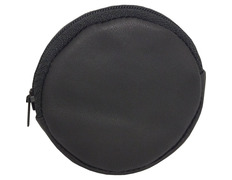The pyx or viaticum box is a small round container typically used by priests when they carry out their pastoral work. The primary purpose of pyxes is to securely transport the Blessed Sacrament with the dignity that corresponds to the Body of Christ.
Whether you are administering to the sick, homebound people in hospitals or other facilities, we are confident that we can help you find the pyx that best suits your needs.
Although historically the terms pyx, viaticum box and burse referred to different pieces of Catholic metalware, today they are often used interchangeably.
The word pyx has its origin in Greek, and in ancient times, it was used to refer to all the sacred vessels used to hold the Blessed Sacrament.
Today, the definition has been narrowed to containers used to carry the Sacred Hosts outside the parish.
It is one of the most common terms for the containers employed to carry and store the sacred hosts. In some geographic areas, this term describes larger containers with unconsecrated hosts.
The meaning of a viaticum box is directly related to the transportation of hosts to give Communion to the sick or dying.
The Royal Spanish Academy (RAE) offers the following meaning of the word viaticum: "The Sacrament of the Eucharist, administered to those in danger of death."
From this definition by the RAE, we can deduce that a viaticum case (or viaticum carrier) is a container used to carry the consecrated Sacred Host to those who are sick and at risk of sudden death.
The Sacrament of Anointing of the Sick grants the Christian a special grace to face the difficulties caused by serious illness or old age. This sacrament, administered by a priest or bishop, consists of anointing the sick person's forehead and hands, accompanied by a liturgical prayer.
Previously known as Extreme Unction, it can now be received more than once whenever there is a serious condition.
This sacrament is administered by the Church to bring health to the soul, spirit, and body of the Christian who is seriously ill or elderly. It can be received as often as necessary, especially in the case of relapses or new serious conditions.
The Anointing of the Sick is a sacrament that brings a series of benefits to the person receiving it:
The Consecrated Hosts are closely related to the Eucharist and liturgical celebrations. In some cases, some parishioners may be unable to attend Mass for various reasons, usually due to health issues.
In these situations, or similar circumstances, pyxes or viaticum cases are used to carry the consecrated hosts. This allows priests or authorized persons to administer Communion to the sick, the homebound, people in hospitals, or other facilities unable to attend the Eucharist in churches.
A priest, deacon, or authorized person frequently carries the Eucharist to people outside the Church who wish to receive Holy Communion. This type of sacred container with secure closures is used to transport the Eucharist, Holy Communion, or Viaticum securely.
The Viaticum, known as provision for the journey, is the name given to the Eucharist received by the dying. This sacrament is offered as spiritual nourishment and strength at the moment of death. The word "viaticum" comes from the Latin via, meaning "road."
The Viaticum is administered both during Mass and outside of it, providing the dying person Communion under both species when possible. The tradition of offering Viaticum to Christians in danger of death dates back to the early centuries of Christianity, and the Council of Nicaea recommended it in 325 as a way to meet the spiritual needs of very sick people.
The Catholic viaticum box plays a fundamental role in this pastoral practice, as it allows for the dignified and symbolic transportation of the Viaticum, reinforcing its role as spiritual provision for the final journey to eternal life.
The Anointing of the Sick complements the Viaticum in the final moments, helping the Christian face death with the strength and comfort of the Eucharist.
Communion should not be administered to a sick person who is not in a condition to understand the meaning of this gesture, although it is advisable to be very certain about this so as not to deprive them of Communion.
Due to their function, pyxes are highly important in the Catholic Church. They
Due to their function, pyxes are highly essential pieces within the Catholic Church. They are usually made from precious metals or have gold plating on the exterior and interior. We also offer many designs made from brass. They are often used to carry unconsecrated hosts.
The lids of pyxes are often decorated with elements related to Communion or Christ. It is critical to remember that the hosts, once consecrated, become the Body of Christ.
These boxes or burse are decorated with reliefs of the Last Supper, the words JHS or IHS, the Lamb of God, chalices, bread, sacred hosts, etc.
The price of pyxes varies depending on the material they are made from, their capacity, and the decoration.
Communion Pyxes, burse, or viaticum box are boxes, usually circular, that are used to carry and administer the Holy Communion, Eucharist, or "viaticum" to the sick and dying outside of the Eucharistic celebration.

Ref: 1F687

Ref: 1F395

Ref: 1F394

Ref: 1R796

Ref: 1F792

Ref: 1F791

Ref: 1F777

Ref: 1F778

Ref: 1F775

Ref: 1F774

Ref: 1F773

Ref: 1F772

Ref: 1F502

Ref: 1F501

Ref: 1F581

Ref: 1F582

Ref: 1F583

Ref: 1F586

Ref: 1R588

Ref: 1F683

Ref: 1F682

Ref: 1F532

Ref: 1F888

Ref: 1F393

Ref: 1F391

Ref: 1F1879

Ref: 1F587

Ref: 190B001